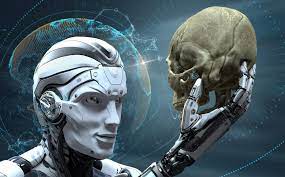Artificial Super Intelligence: The Quest for the Ultimate Machine Mind
MILITARY TECHSCIENCE
Sahil Sharma
10/19/20233 min read


Artificial Intelligence (AI) has taken the world by storm, reshaping industries, revolutionizing technology, and even changing the way we live and work. But as AI continues to advance at an exponential rate, scientists and experts are increasingly pondering a future beyond standard AI, one where machines surpass human intelligence. This hypothetical concept is known as Artificial Super Intelligence (ASI). In this article, we explore the idea of ASI and what leading scientists think about the possibilities and implications it may bring.
Defining Artificial Super Intelligence
Artificial Super Intelligence, often referred to as "strong AI," stands at the pinnacle of AI development. It envisions machines that possess cognitive abilities exceeding those of humans in every aspect. Unlike the current state of AI, which is limited to narrow, task-specific intelligence, ASI would have a broad and deep understanding of the world, enabling it to perform any intellectual task with excellence.
The Views of Leading Scientists
The concept of ASI has sparked significant debate and contemplation among scientists, engineers, and futurists. While there is a wide range of opinions, some prominent experts have expressed their thoughts on this potentially transformative development.
Elon Musk: The founder of SpaceX and Tesla, Elon Musk, is known for his vocal concerns about ASI. He has warned that developing ASI without sufficient caution could lead to catastrophic consequences. Musk is a proponent of ensuring that AI development is regulated and carefully monitored to prevent unintended risks.
Stephen Hawking: The late theoretical physicist Stephen Hawking also expressed concerns about ASI. He cautioned that if a superintelligent AI is not properly controlled, it could pose a threat to humanity. He stressed the need for international collaboration to address the potential dangers.
Ray Kurzweil: Futurist and AI expert Ray Kurzweil takes a more optimistic stance. He believes that ASI will be a significant boon to humanity. Kurzweil has been a pioneer in AI and predicts that the integration of ASI with the human mind will lead to unprecedented advancements in fields like medicine and technology.
Nick Bostrom: Philosopher and AI researcher Nick Bostrom's work delves deep into the ethics and safety concerns surrounding ASI. He has founded the Future of Humanity Institute, which focuses on the long-term impact of AI, including the risks and benefits of ASI. Bostrom emphasizes the importance of developing AI with ethical guidelines and safety measures.
The Road to ASI: Challenges and Milestones
Creating Artificial Super Intelligence is a daunting task that goes beyond just improving current AI systems. It entails solving intricate challenges in machine learning, natural language processing, reasoning, and a deep understanding of human emotions and ethics. Achieving ASI is considered by many to be the ultimate scientific and technological goal.
To date, we have made significant strides in AI development, witnessing remarkable achievements in areas like deep learning, image recognition, and natural language understanding. But while these advancements are impressive, we have yet to create machines with the breadth and depth of intelligence to be classified as ASI.
The Future of ASI: Promises and Perils
Artificial Super Intelligence holds the promise of monumental breakthroughs in fields such as medicine, environmental conservation, and scientific discovery. It could accelerate our progress in ways that are difficult to fathom.
However, it also presents risks. The uncontrolled rise of superintelligent machines could have unintended consequences, raising ethical and existential questions. The potential for misuse, power imbalances, and the lack of safeguards are all genuine concerns.
The Path Forward
While ASI remains a subject of intense debate and speculation, it is clear that its development, if realized, will profoundly impact society, ethics, and humanity itself. Scientists and experts agree that AI research must be coupled with rigorous ethical guidelines, strict safety measures, and global cooperation to ensure the responsible and safe development of Artificial Super Intelligence. The path forward is paved with challenges and uncertainties, but it is a journey that humanity must undertake with great care and wisdom. The quest for Artificial Super Intelligence will not only define the future of technology but also the future of our civilization.
